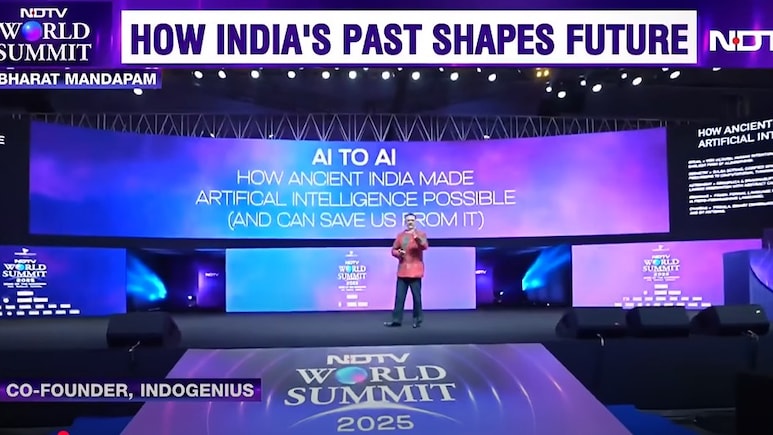
Medieval Europeans once considered Ujjain, in present-day Madhya Pradesh, the centre of the world for their astronomical calculations, IndoGenius co-founder Nick Booker has said.
The international consultant, who advises universities, companies, government agencies, and investors on building engagement with India, shared the insight at the NDTV World Summit 2025 last week in Delhi during a session titled "How Ancient India Made Artificial Intelligence Possible."
"When we think today about India and IST being five and a half hours from GMT, and the centre of the map running through Greenwich in London, the English actually thought in the 13th century, as did most Europeans, that the centre of the world for their calculations was right here in India, in what is now Madhya Pradesh," Booker said.
Booker shared how ancient Indian discoveries in geometry, algorithmic thinking, linguistics, binary systems, and astronomy influenced the development of modern science. He pointed out that Indian numerals, zero, and place value systems were adopted by European scholars in the 12th and 13th centuries.
#NDTVWorldSummit | "English used to think the centre of the world was in India, in Madhya Pradesh" : Nick Booker (@Indo_Genius), Co-Founder at IndoGenius#NDTVWorldSummit2025 pic.twitter.com/4Y8YOmYGHg
— NDTV (@ndtv) October 18, 2025
"European tables for computing the date of Easter were based on astronomical observations made in Ujjain by Brahmagupta," he explained.
Booker compared European and Indian ways of thinking, describing Europeans as favouring axiomatic model-making, where theories are built from self-evident truths.
In contrast, Indian thought, as described by IISc scholar Roddam Narasimha, practised "computational positivism", relying on observation and adapting models to reality.
Explaining the difference, Booker gave an example, "If all monkeys climb trees, and we say the porcupine is a monkey, then the porcupine climbs trees. Logical? Yes. Correct? No. Europeans accept the axiom; Indian computational positivism would reject the false premise based on real-world data."
He also drew parallels with modern AI systems, explaining that data-driven approaches can avoid errors arising from incorrect assumptions.
Booker spoke of the power of Indian mythology and historical narratives in shaping thinking across cultures. From the story of chess and exponential growth to the Samudra Manthan, he showed how Indian metaphors convey lessons in logic, collaboration, and transformation. "The more you learn about Indian stories, the more you understand patterns that help explain today's world," he said.
"We are living in the first Indian decade of what will prove to be the Indian century," he added.
Track Latest News Live on NDTV.com and get news updates from India and around the world

